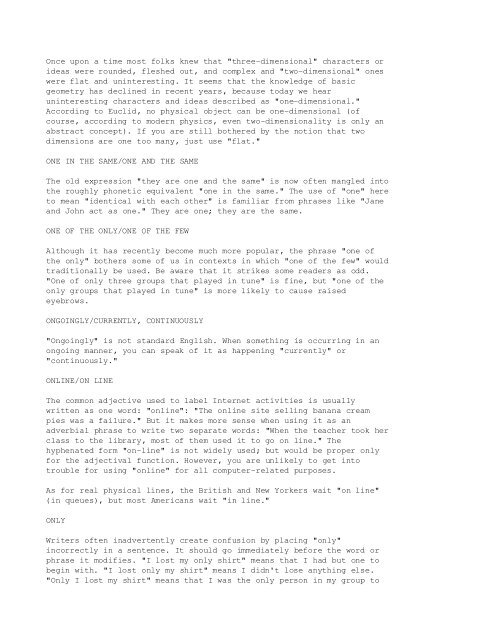Common_Errors_in_English_usage
Common_Errors_in_English_usage
Common_Errors_in_English_usage
You also want an ePaper? Increase the reach of your titles
YUMPU automatically turns print PDFs into web optimized ePapers that Google loves.
Once upon a time most folks knew that "threedimensional" characters or<br />
ideas were rounded, fleshed out, and complex and "twodimensional" ones<br />
were flat and un<strong>in</strong>terest<strong>in</strong>g. It seems that the knowledge of basic<br />
geometry has decl<strong>in</strong>ed <strong>in</strong> recent years, because today we hear<br />
un<strong>in</strong>terest<strong>in</strong>g characters and ideas described as "onedimensional."<br />
Accord<strong>in</strong>g to Euclid, no physical object can be onedimensional (of<br />
course, accord<strong>in</strong>g to modern physics, even twodimensionality is only an<br />
abstract concept). If you are still bothered by the notion that two<br />
dimensions are one too many, just use "flat."<br />
ONE IN THE SAME/ONE AND THE SAME<br />
The old expression "they are one and the same" is now often mangled <strong>in</strong>to<br />
the roughly phonetic equivalent "one <strong>in</strong> the same." The use of "one" here<br />
to mean "identical with each other" is familiar from phrases like "Jane<br />
and John act as one." They are one; they are the same.<br />
ONE OF THE ONLY/ONE OF THE FEW<br />
Although it has recently become much more popular, the phrase "one of<br />
the only" bothers some of us <strong>in</strong> contexts <strong>in</strong> which "one of the few" would<br />
traditionally be used. Be aware that it strikes some readers as odd.<br />
"One of only three groups that played <strong>in</strong> tune" is f<strong>in</strong>e, but "one of the<br />
only groups that played <strong>in</strong> tune" is more likely to cause raised<br />
eyebrows.<br />
ONGOINGLY/CURRENTLY, CONTINUOUSLY<br />
"Ongo<strong>in</strong>gly" is not standard <strong>English</strong>. When someth<strong>in</strong>g is occurr<strong>in</strong>g <strong>in</strong> an<br />
ongo<strong>in</strong>g manner, you can speak of it as happen<strong>in</strong>g "currently" or<br />
"cont<strong>in</strong>uously."<br />
ONLINE/ON LINE<br />
The common adjective used to label Internet activities is usually<br />
written as one word: "onl<strong>in</strong>e": "The onl<strong>in</strong>e site sell<strong>in</strong>g banana cream<br />
pies was a failure." But it makes more sense when us<strong>in</strong>g it as an<br />
adverbial phrase to write two separate words: "When the teacher took her<br />
class to the library, most of them used it to go on l<strong>in</strong>e." The<br />
hyphenated form "onl<strong>in</strong>e" is not widely used; but would be proper only<br />
for the adjectival function. However, you are unlikely to get <strong>in</strong>to<br />
trouble for us<strong>in</strong>g "onl<strong>in</strong>e" for all computerrelated purposes.<br />
As for real physical l<strong>in</strong>es, the British and New Yorkers wait "on l<strong>in</strong>e"<br />
(<strong>in</strong> queues), but most Americans wait "<strong>in</strong> l<strong>in</strong>e."<br />
ONLY<br />
Writers often <strong>in</strong>advertently create confusion by plac<strong>in</strong>g "only"<br />
<strong>in</strong>correctly <strong>in</strong> a sentence. It should go immediately before the word or<br />
phrase it modifies. "I lost my only shirt" means that I had but one to<br />
beg<strong>in</strong> with. "I lost only my shirt" means I didn't lose anyth<strong>in</strong>g else.<br />
"Only I lost my shirt" means that I was the only person <strong>in</strong> my group to





